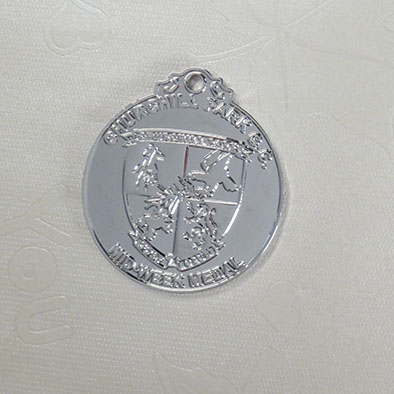Souvenir medal supplier to share with you: I saw the Olympic Games for the first time and heard the Olympic gold and silver medals and bronze medals. The second round took it for granted that since it is called a gold medal, it must be pure gold. If you think so, then you are very wrong. However, the reality is always cruel. The so-called Olympic gold medals are not pure gold medals, and they usually contain very little gold. Take the gold medal in Rio this year, in a 500g gold medal, it contains 6g of gold, but the gold content is only about 1.2%.
The sports meeting medals didn't turn out to be pure gold? Why is it called a gold medal? This has to be said from history. The tradition of Olympic medal awards began when the first Athens Olympic Games in 1896. At that time, only the first two medals were awarded, the first silver and the second bronze. In the second 1900 Olympic Games, the top three had no medals, only a rectangular medal. The first gold medal was awarded in the 3rd St. Louis Olympic Games in the United States, and then until the 5th Stockholm Stockholm Olympic Games. For the third consecutive Olympic Games, the champion won gold medals made of pure gold. Was the host country of the Olympic Games particularly rich? Neither is it.
The main reason was that gold was cheaper at the time. For example, the gold medal at the Stockholm Olympics in 1912 was pure gold and weighed 24 grams. At that time, the cost was only $ 16-and the cost of a gold medal at the Rio Olympics this year was about $ 600.

Sports Meeting Medals
In addition, there are few early Olympics events, and the number of participating countries is also small. For example, in the third Olympics, only 89 gold medals were born-while the total number of gold medals in the Rio Olympics was 812. At the same time, the total number of participants in the third Olympic Games was only 689, of which the US National Team had as many as 533 participants, and it turned out to be the host. As the price of gold soared along with the number of participants and the number of medals awarded, even the medals became bigger and bigger, and the pure gold medals could not be supported at all. Under such circumstances, the 1978 Olympic Committee stipulated gold Conditions: The diameter must not be less than 60 mm, and the thickness must not be less than 3 mm. Gold and silver medals must use silver with a purity of 92.5% as the main material.
And the gold medal is not less than 6 grams. Fortunately, it is stipulated that gold medals do not need pure gold, otherwise based on the price of 24k gold at 300 yuan / gram, the gold medal for the Rio Olympics alone will cost 300 yuan / gram * 500g * 812 (pieces) = 121,100,000. RMB.
Although the Olympic Games were almost impossible because of insufficient money, the gold medals were unambiguous and the weight of the medals was 500g. However, the heaviest medals in the previous Summer Olympics-in addition, the heaviest medal before was the 12th London Olympics. Medal, weight is 400g
Looking at the comparison of the numbers, the second round has a feeling that each country is more luxurious than other people's medals: You know, the 2008 Beijing Olympics medal is only 200g. However, although our medals are light, it is not that we cut corners in the Olympic Games because we use gold inlaid jade as a material, not only gold, but also valuable jade.
Since the second round knew that there was only a small amount of gold in the Olympic gold medals, they suddenly felt that when they were young, they would "work hard to be Olympic champions, so that they would not be able to survive in the future, and they would live well after selling the gold medals".
I donŌĆÖt know if you guys have thought about it, but although the medal itself is not valuable, the meaning of the medal itself lies in the hard work and hard work of the athletes. Many countries will also give extra bonuses to Olympic champions. For example, Singapore, which has never won an Olympic gold medal, promises that if a Singapore athlete wins the championship, he will receive a sky-high prize of up to $ 800,000.
In addition to bonuses, it is also a great help to the improvement of commercial value and popularity. So although the commemorative challenge gold medal is not pure gold and worthless, it means something special to athletes.